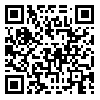Volume 11, Issue 2 (Mar & Apr 2021)
J Research Health 2021, 11(2): 77-86 |
Back to browse issues page
Download citation:
BibTeX | RIS | EndNote | Medlars | ProCite | Reference Manager | RefWorks
Send citation to:



BibTeX | RIS | EndNote | Medlars | ProCite | Reference Manager | RefWorks
Send citation to:
Eftekhari M, Amanelahi A, Christopher Perry J, Rajabi G, Aslani K. Explaining the Marital Adjustment Process in Iranian Women: A Grounded Theory Study. J Research Health 2021; 11 (2) :77-86
URL: http://jrh.gmu.ac.ir/article-1-1797-en.html
URL: http://jrh.gmu.ac.ir/article-1-1797-en.html
Maryam Eftekhari1 

 , Abbas Amanelahi2
, Abbas Amanelahi2 

 , John Christopher Perry3
, John Christopher Perry3 

 , Gholamreza Rajabi1
, Gholamreza Rajabi1 

 , Khaled Aslani1
, Khaled Aslani1 




 , Abbas Amanelahi2
, Abbas Amanelahi2 

 , John Christopher Perry3
, John Christopher Perry3 

 , Gholamreza Rajabi1
, Gholamreza Rajabi1 

 , Khaled Aslani1
, Khaled Aslani1 


1- Department of Counselling, School of Education and Psychology, Shahid Chamran University of Ahvaz, Ahvaz, Iran.
2- Department of Counselling, School of Education and Psychology, Shahid Chamran University of Ahvaz, Ahvaz, Iran. ,a.amanelahi@scu.ac.ir
3- Department of Psychiatry, School of Public Health, McGill University, Montreal, Quebec, Canada.
2- Department of Counselling, School of Education and Psychology, Shahid Chamran University of Ahvaz, Ahvaz, Iran. ,
3- Department of Psychiatry, School of Public Health, McGill University, Montreal, Quebec, Canada.
Abstract: (4145 Views)
Background: Marital adjustment has a positive effect on the physical and mental health of family members. The purpose of this study was to explain the process of marital adjustment in Iranian women.
Methods: This research is based on qualitative data analysis using the grounded theory method. Theoretical and purposeful sampling was used for data collection. Sampling continued until theoretical saturation. A total of 15 women from Ahvaz participated in the semi-structured interview. Interviews were analyzed using the Strauss and Corbin comparative method.
Results: By open coding, 17 primary codes, and axial coding, 9 major themes, related to marital adjustment were obtained. Marital adjustment: An incentive to maintain marital life were extracted as the central category influenced by contextual, causal, and confounding conditions. Contextual conditions include emotional bonding with parents and spouse. Causal conditions are an emphasis on self and relationship with another and how to express self in the relationship. Interfering conditions include a relationship with the main family, spouse, and social comparison. Strategies include defense mechanisms and empathy. The consequences of marital adjustment were also the sense of security and comfort.
Conclusion: Marital adjustment can be considered in curing marital maladjustment and conflicts and help therapists to have a better understanding of marital dynamics.
Methods: This research is based on qualitative data analysis using the grounded theory method. Theoretical and purposeful sampling was used for data collection. Sampling continued until theoretical saturation. A total of 15 women from Ahvaz participated in the semi-structured interview. Interviews were analyzed using the Strauss and Corbin comparative method.
Results: By open coding, 17 primary codes, and axial coding, 9 major themes, related to marital adjustment were obtained. Marital adjustment: An incentive to maintain marital life were extracted as the central category influenced by contextual, causal, and confounding conditions. Contextual conditions include emotional bonding with parents and spouse. Causal conditions are an emphasis on self and relationship with another and how to express self in the relationship. Interfering conditions include a relationship with the main family, spouse, and social comparison. Strategies include defense mechanisms and empathy. The consequences of marital adjustment were also the sense of security and comfort.
Conclusion: Marital adjustment can be considered in curing marital maladjustment and conflicts and help therapists to have a better understanding of marital dynamics.
Type of Study: Orginal Article |
Subject:
● Psychosocial Health
Received: 2019/07/16 | Accepted: 2020/01/2 | Published: 2021/04/1
Received: 2019/07/16 | Accepted: 2020/01/2 | Published: 2021/04/1
| Rights and permissions | |
 |
This work is licensed under a Creative Commons Attribution-NonCommercial 4.0 International License. |






